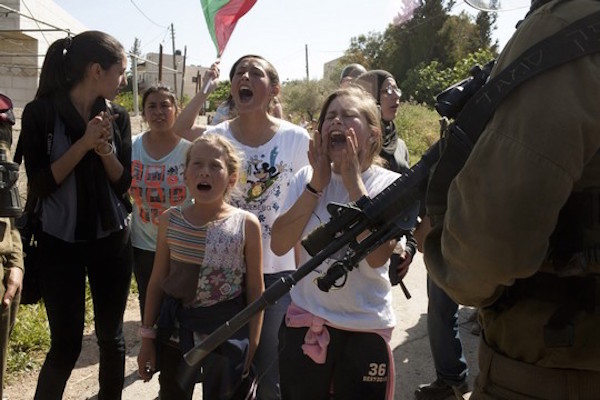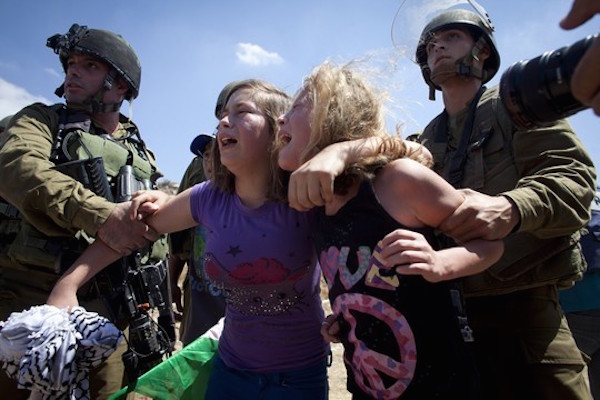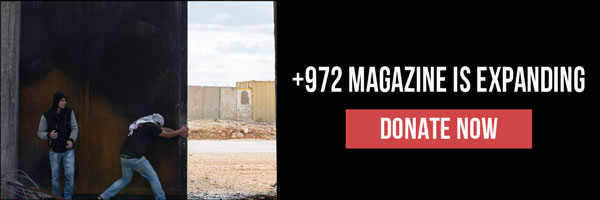How one IDF raid turned a Palestinian teenager into a heroine overnight.
By Yali (Yael) Marom

The IDF Spokesperson was clearly excited to publish the details of a complicated military operation that took place Tuesday morning: under the cover of darkness, Israeli Border Police broke into the Tamimi family’s home and arrested 17-year-old Ahed, taking her in for interrogation. The Israeli forces arrived at the family’s home fully armed; however, their most important weapon was their camera. The goal: to win back some of the army’s masculinity, wounded a few days after a video surfaced of the rebellious girl attempting push soldiers out of her house — cursing and shoving them, even kicking and slapping.
The Israeli public is accustomed to submissive Palestinians — and if not, it is accustomed to seeing them beaten and arrested, regardless of whether they present an actual danger or are engaged in an act of protest. That is precisely what didn’t happen this week, and it is what disrupted all of the rules of the game, so much so that Channel 2 commentator Roni Daniel said Monday that he is unperturbed by the possibility that soldiers might be caught on camera beating the girls who disrespected them. We are used to criticism from the international community about the violence of the occupation, but we are not so accustomed to criticism over two soldiers who thought before raising their hands to strike.
Here’s the story: a young woman was arrested in the middle in the night, on camera, because Israeli soldiers did not appear manly enough. To carry out the arrest, they sent a female Border Police officer. So this is what equality looks like.
Minister of Education Naftali Bennett has already determined Ahed’s sentence: “She should spend her life in prison.” Yinon Magal, a former Knesset member, expressed his longing for Elor Azaria — the Israeli soldier convicted of manslaughter for shooting a wounded Palestinian assailant in the head and killing him. Magal made clear the moral bar according to which future incidents will be judged. Every soldier knows exactly what is expected of him. And besides, even without Magal’s tweet, the commanding ethos is clear as day. Meanwhile, Netanyahu and Liberman are already preparing a law that will sentence to death any Palestinian who dares to resist.
The headlines debate whether the soldiers demonstrated weakness or restraint. This morning, those headlines also generated feelings of vengeance among the online comments sections, as well as on Twitter. A few hours after Ahed was detained, her mother, Nariman, who had accompanied her to the police station, was also taken in for investigation. But amid the media circus and the debate around the morality of the brave soldiers, the broader context, of course, is absent. What leads a girl, who in any other place in the world would be busy with schoolwork, hobbies, and dreams of the future (a year ago Ahed said that if it were not for the occupation, she would be a soccer player) to endanger herself by standing up to armed soldiers?
Ahed Tamimi was born into the occupation. As the daughter of parents who are leading activists in the popular struggle against the occupation in the village of Nabi Saleh, she has been part of the struggle her entire life. She grew up in a reality in which her parents and brother were arrested repeatedly, in which her father served a long prison sentence for being a political leader: a reality of routine night raids, armed soldiers, settler attacks, and checkpoints. In this reality, every protest by the residents of Nabi Saleh is considered illegal by the military, and is suppressed with violence — whether tear gas, rubber bullets, live fire, and other means. It is a reality in which you or your loved ones could be gravely wounded or killed at any time.

Ahed was nine when weekly demonstrations began in Nabi Saleh to protest the seizure of the village’s spring by settlers. The army quickly moved to defend the settlers’ theft of the spring, and began to deploy soldiers to prevent Palestinian demonstrators from reaching the spring or the adjacent road also used by settlers. Israeli forces used every possible means to suppress the protests, often by stopping the demonstrators while they were still within their village.
When Ahed was 12, her mother’s cousin, Mustafa Tamimi, was killed before her eyes during a protest, shot in the head by gas canister. One year later, she witnessed the army shoot and kill her uncle Rashadi. Last week, her cousin Mohammed, nearly her age, was shot in the face by a rubber-coated bullet that penetrated his skull. He remains unconscious.
Ahed and her family continue their struggle. They continue to march and demonstrate. And they continue to pay the price for their refusal to accept the status quo, for their steadfast challenge to mechanisms of the occupation.
Over the past years, pictures of Ahed Tamimi have appeared again and again, each time standing barehanded and straight-backed facing down heavily armed and armored soldiers: the female version of David facing Goliath. These pictures have driven the Right crazy, and right-wingers have been demanding the arrest of the “provocateur” for some time. This morning, the army finally gave them what they’ve been demanding. But it also gave the Palestinians a new heroine, one more in a long history of women who for decades have struggled unceasingly for their freedom.
Free Ahed Tamimi.
Yael Marom is Just Vision’s public engagement manager in Israel and a co-editor of Local Call, where this article was originally published in Hebrew. Read it here.

